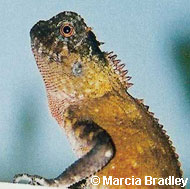Description:
This is a lizard from deep rain forests where living in high humidity is an absolute must. This is tricky to simulate in captivity without creating a dank, moldy environment, so extra care must be made to mist daily while also providing ventilation to evaporate the moisture constantly. Keep a mist bottle of clean water next to the cage and use it nearly every time you view the mountain horned dragons. Failure to do so may result in skin shedding problems and dehydration because this is the main way mountain horned dragons drink. Feeding is much simpler and straight-forward – mountain horned dragons eat almost any kind of insect offered. Small types like half-grown crickets, regular mealworms and waxworms are perfect, but remember that variety beyond the ‘standard’ pet shop types is always beneficial for trace minerals. Mountain horned dragons eat during daylight hours. Give mountain horned dragons of the genus Acanthosaura plenty of branches to climb upon, especially vertically-oriented ones to simulate the tall trees they usually live in. At the top on one end, aim a small heat lamp so they have access to a hot spot for basking. Soil or mulch makes a good substrate, and a live potted plant adds color and a place to lick droplets when they’re sprayed. .
Habitat:
Very arboreal, preferring the higher parts of forest trees
Range:
Southeast Asia
Scientific Name: Acanthosaura capra
Species Group:
Family: Agamidae
Size: 10 to 12 inches
Level: intermediate
Weight:
Dangerous: No



